Adelaide’s worst hoarder homes revealed including Colin and Celia Roediger, Leslie Warner
Scrap metal, cars, caravans, umbrellas and a bus – you won’t believe the junk kept by some of Adelaide’s worst hoarders and the battles with owners to clean them up.
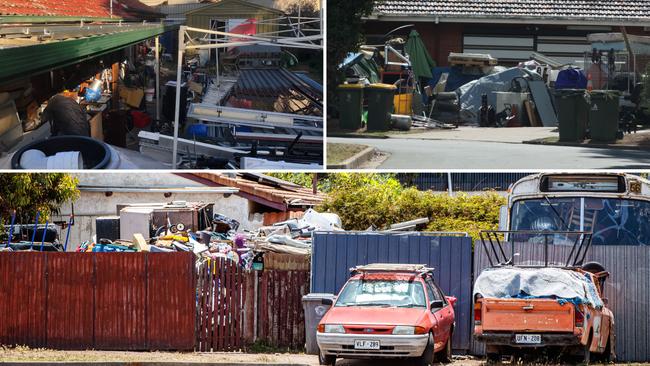
South
Don't miss out on the headlines from South . Followed categories will be added to My News.
- Adelaide councils take legal action against hoarders
- How to get the most out of your Advertiser digital subscription
Their properties are a constant source of frustration for neighbours and local councils who spend thousands trying to get them to clean up their acts.
This year, at least five Adelaide councils have taken legal action against hoarders and owners of unsightly properties.
Some have not been cleaned up after more than three years of attempts from councils, another has attracted more than 70 complaints from neighbours.
Here are some of Adelaide’s worst hoarder homes.
Colin and Celia Roediger
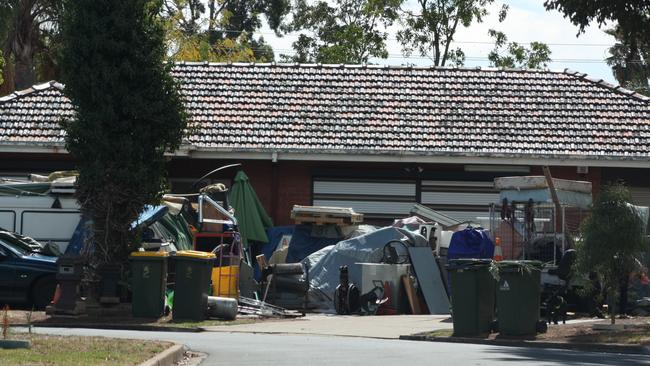
In July, Mitcham Council ordered Colin Lewis Roediger and Celia Valencia Roediger to clean up their Melrose Park property within 60 days.
The Mead Crescent home was cluttered with car tyres, car parts, furniture, scrap metal, plastic drums and crates, pallets, umbrellas, mattresses, vehicle parts and traffic devices.
At the time, Mr Roediger told The Messenger he had planned to have a garage sale to clear his land but had to cancel it because of the coronavirus pandemic.
He said most of the clutter belonged to his son, who had recently moved back in, and he was in the process of sorting through it.
Despite the council taking legal action, a nearby resident told The Messenger he would “believe it when I see it cleaned up”.
Christopher Lewis Roediger
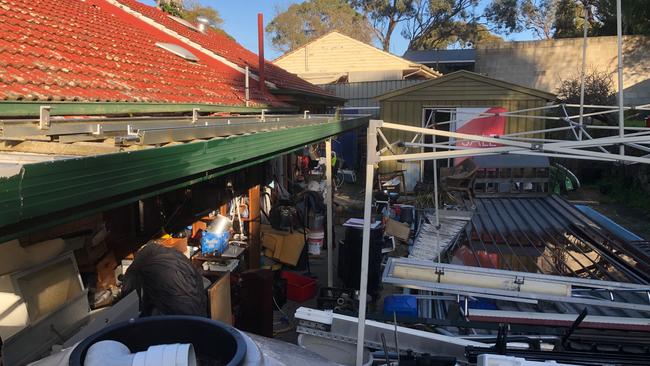
Local residents claim they’ve been complaining about the state of Christopher Lewis Roediger’s Happy Valley home for more than three years.
Trailers, a caravan, tents, umbrellas, old signs, shopping trolleys, fridges and even a shipping container litter the Jarrad Road home and yard.
Onkaparinga Council confirmed it had issued fines and undertaken two forced clean-ups of the property since late 2019.
But a nearby resident, who wished to remain anonymous, said even the forced cleans hadn’t made a difference.
“As they were cleaning up, he rocked up with another trailer full of stuff to unload into the yard when they finished,” he said.
Onkaparinga Council has since commenced legal action against Mr Roediger in the Environment, Resource and Development (ERD) Court.
Leslie Warner
Onkaparinga Council has been working with Leslie Warner for more than two years to get his Aldinga Beach home cleaned up.
The Berry Street home and yard was cluttered with several cars, a bus and general junk.
Mr Warner had been given a number of deadlines by the council since 2018 to remove the items from the property.
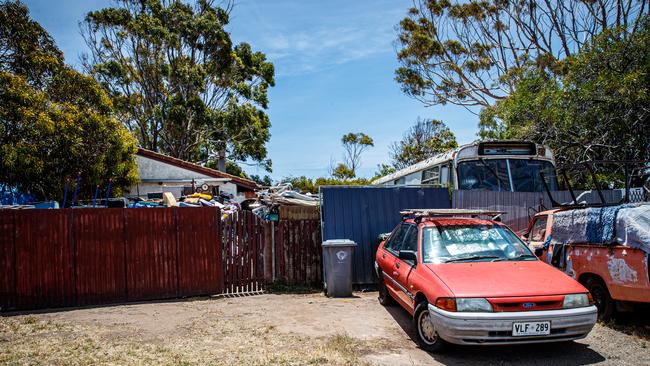
He lodged an appeal last year, in the ERD Court against Onkaparinga’s decision to take further action and issue a Section 84 notice requiring him to tidy up the property by March this year.
Court documents showed Mr Warner, a disability pensioner, had struggled to clean up the property due to chronic pain and lack of mobility.
This month, Mr Warner withdrew his appeal as part of negotiations with Onkaparinga Council.
“Council continues to work with the landowner in finalising the clean-up of the property,” an Onkaparinga Council spokesman said at the time.
Graham Lynton Moyle
This year, Tea Tree Gully Council took legal action against Ridgehaven man Graham Lynton Moyle over the state of his Far View Crescent property.
The council argued there had been a change in land use to an “unapproved junkyard”.
But that wasn’t the first time the council has had to take action against Mr Moyle to tidy up the property.
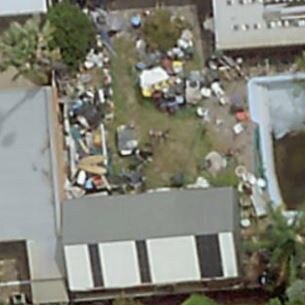
In 2016, the council applied to the ERD Court to serve a summons to Mr Moyle requesting all trailers, car bodies, scrap metal, tyres and general junk be removed within 60 days.
It is understood junk started piling up at the front of the property in 2009 before 2m-high fences were erected.
Tea Tree Gully Council was unable to provide further information regarding the property.
Peter Paul Paszkiewicz
Port Adelaide Enfield Council took legal action against Peter Paul Paszkiewicz after claiming the Glanville property was being used as a junkyard.
However, according to documents lodged with the ERD Court the council had trouble serving Mr Paszkiewicz with a summons.
Items at the Graham Street property included scrap metal, hoses, brooms, a screen door and plastic bags containing domestic waste.
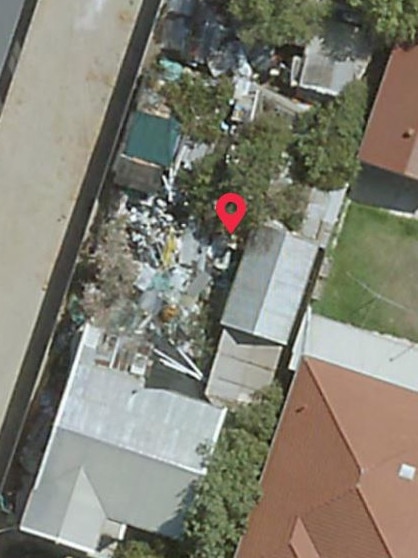
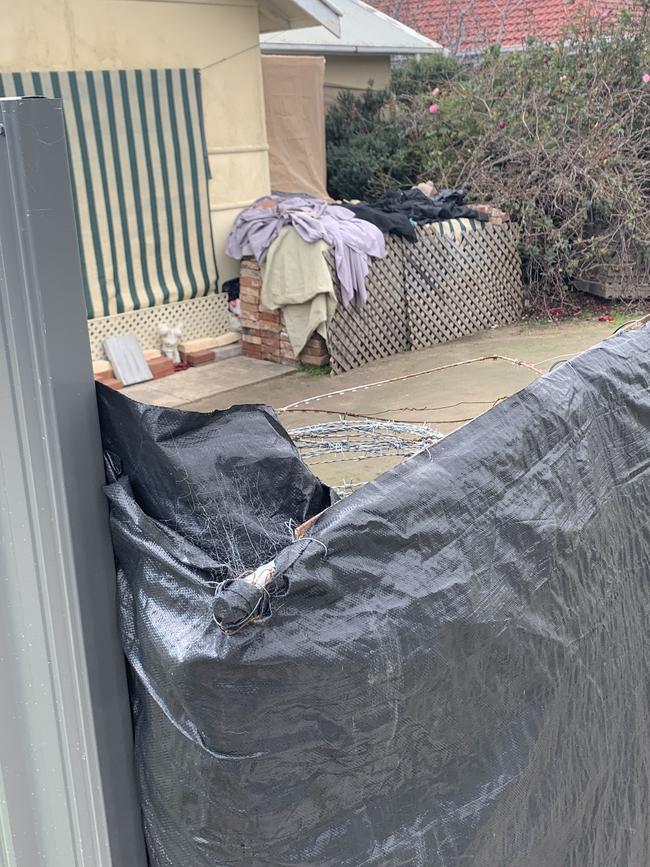
At the time, Port Adelaide Enfield Mayor Claire Boan said council staff were working with Mr Paszkiewicz “to achieve a positive outcome and resolve the matter within the agreed time frame”.
She said council officers took an “educational approach”, where appropriate, when public health risks are involved.

